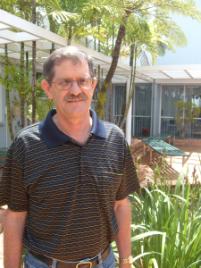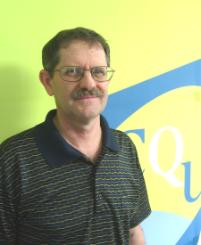History becomes future for career traveller
Published on 28 November, 2008
There have been plenty of twists and turns in John McGrath's career path. Now he is finding that history is his future.
John started his professional life as a commercial accountant and, looking for more challenges, gravitated into management to run a mid-size agricultural and industrial equipment manufacturing company for almost 10 years.

John McGrath at Bundaberg Campus
"When the company was taken over in 1996, I retired to a grazing property that I had owned for a number of years," he said.
"Anxious not to let my commercial skills languish, I served as a local government councillor for 7 years.
"During this ‘retirement' period I attended the Building Rural Leaders Program run by the Department of Natural Resources. Among other things, the program challenged participants to review where they were in their life and whether they had realised their full potential.
"As a compulsive reader with a passion for history, I wondered if there was another career left in me.
"To cut a long story short, we sold the property in 2004 and I enrolled in the BA program at CQUniversity with a double history plan. I graduated in 2007, and in 2008 enrolled in the History Honours program."
Now aged 59 and married with no children, John said he appreciated the encouragement he gained from the University's history department which "gave me the confidence to settle in for the long haul". He has since earned some academic awards along the way.
His Honours dissertation is focused on religious history (although he also has an interest in economic history) but he is yet to decide on an area of specialisation.
John believes that history written solely for historians, although laudable from an academic standpoint, risks consigning it to the margins.
"In my view, if it does not have social utility, history is not worth pursuing as a professional discipline," he said.
"History's future as an independent discipline, safe from the attacks of the more extreme post-modernists, is best secured by ensuring that it has a broad market.
"I therefore champion the populist style of history written by greats such a Geoffrey Blainey and Manning Clark."
John said he accepts that history will always be, and should always be, contestable because it is no more than probable truth that unavoidably carries some of the writer's bias.
"As a general principal, I believe that all history should be placed in as wide a context as possible. I further believe that kids should learn about the contestability of history from their first year of high school. If nothing else, it will help them to cope with the reality that in the Humanities there are few issues that are totally black and white.
"The social utility of history is that by knowing the past we can understand the present and grapple with the future. Through such understanding, individuals and society develop a sense of identity that assigns value to both their individuality and to the society of which they are a part."
In related recent news:


